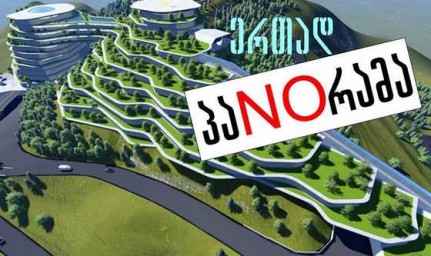Statement of NGOs about Arrested and Fined Persons during Peaceful Demonstration “No to Panorama”
October 1, 2015

On July 19, 2015 Tbilisi City Court announced decision on the case of ten people arrested during the demonstration No to Panorama in front of the Tbilisi City Council. Georgian Young Lawyers’ Association defended rights of the detainees at the court. Police officers had drafted protocol under Article 166 of the Administrative Code of Georgia (minor hooliganism) with regard to 8 detainees and two protocols under Article 166 and Article 173 (disobedience to lawful request of police officer). The Court dropped cases against three persons but fined 7 persons for minor hooliganism with 100 lari. The court concluded that slogan used during the demonstration, which identified the Panorama project with genitals, was act of minor hooliganism. We are concerned with the fact that the Court failed to adequately evaluate improper interference of police officers into the freedom of assembly and expression. Thus, the court evaluated freedom of speech guaranteed by the Constitution of Georgia and Law of Georgia on the Freedom of Speech and Expression as an offence. This judgment degraded the freedom of speech standards guaranteed by the Constitution and international obligations of Georgia that was also guaranteed by the case law of the General Courts of Georgia.
We would like to note that although the particular word used by the protesters was not acceptable by the society or one part of the society, freedom of expression protects not only the information which is perceived neutral by everybody but also the idea and information that insults, excites or shocks the society or one part of it. It is requirements of the democratic society on pluralism, tolerance and diverse of opinions (Judgment of the ECtHR into the case Lingens v Austria).
In democratic society, a state shall not have authority to clean opinions and words (phrases) in public environment to make them acceptable only for one part of society because whatever is acceptable for one person might sound vulgar for another. Estimation particular difference between these two notions is issue of personal taste and style of each individual and not the competence of the state and public servants (see judgment of the US Supreme Court into the case Cohen v California).
It is noteworthy to correctly evaluate the context of the disputed word (phrase). In accordance to the Article 9 (b) of the Law of Georgia on Freedom of Speech and Expression, state has authority to regulate obscenity but in accordance to the Article 1 (f) of the same law, obscenity is a statement, which does not have a political, cultural, educational or scientific value harshly violating universally recognized ethical norms of society. In this particular case, the word was used during peaceful demonstration which protested state action when despite high public profile and petition of thousands of Tbilisi residents, the state institutions issued permission on construction in secret without participation of interested parties. Consequently, the disputed word was used with regard to high public profile case and aimed to attract public attention to the acute problem that cannot be evaluated as obscenity and legal basis for the punishment of citizens.
Analysis of the court judgment shows that the Court did not evaluate the political value of the disputed expression and discussed it in a fragment way without considering the context and purpose of the protest. Besides, the Court did not discuss the issue of the addressee who might have been insulted with the work. Considering the factual circumstances of this case, there was no subject at all because the demonstration protested concrete project and not a person. Consequently, there was no legitimate interest to restrict obscenity. Contextual restriction of the freedom of expression and state interference into evaluation of moral categories contradicts the idea of plural and free public environment and creates threats to introduce ideological and ethic discourse with the use of repressive state apparatus. Similar approach might have freezing effect for other groups which will have desire to enjoy freedom of expression in future.
We believe that the precedent undermines not only freedom of assembly and expression but also state commitment to democratic values.
We call on all three branches of the government and their representatives to implement their commitments under the Constitution and not only respect the rights and basic freedoms guaranteed by the Constitution but also do their utmost to ensure practical realization of their defense and protect them from improper interference.
Signatory organizations:
- Georgian Young Lawyers’ Association
- Identoba
- Civil Development Agency (CIDA)
- Partnership for Human Rights
- Green Alternative
- Transparency International – Georgia
- Human Rights Education and Monitoring Center
- Article 42 of the Constitution
- Information Freedom Development Institute
- Human Rights Center
News
December 13, 2023
Ethnic minorities outside the peace dialogue
November 6, 2023
‘Peace’ agenda of political parties
Popular
Articles
February 13, 2024



